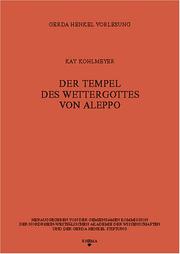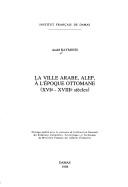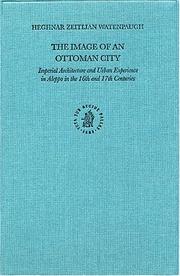| Listing 1 - 8 of 8 |
Sort by
|
Book
ISBN: 9004414002 9004379029 Year: 2020 Publisher: Leiden Boston : BRILL,
Abstract | Keywords | Export | Availability | Bookmark
 Loading...
Loading...Choose an application
- Reference Manager
- EndNote
- RefWorks (Direct export to RefWorks)
Aleppo and its Hinterland in the Ottoman Period comprises eleven essays in English and French by leading scholars of Ottoman Syria which draw on new research in Turkish, Levantine and other archival sources. Focusing on both the city and its place in the wider region, the collection examines trade guilds and Christian settlement in Aleppo, Turkmen and Bedouin tribes in Aleppo’s interior, international trade and the establishment of an Ottoman commercial tribunal in the Tanzimat period, Aleppo and the rise of the millet system, the Belgian consular presence, Sufi networks in the province of Aleppo, the countryside of Antioch under the Egyptian occupation, and the urban revolt of 1850. With contributions from Enver Çakar, Elyse Semerdjian, Charles Wilkins, Stefan Winter, Mary Momdjian, Bruce Masters, Sylvain Cornac, Mafalda Ade, Feras Krimsti, Nicolas Jodoin, Stefan Knost.
Aleppo (Syria) --- Turkey --- Ottoman Empire --- Aleppo --- Alep (Syria) --- Beroea (Syria) --- Chale (Syria) --- Chelbon (Syria) --- Haleb (Syria) --- Helbon (Syria) --- Halēp (Syria) --- Khalepion (Syria) --- Biblical Beroea (Syria) --- Berea (Syria) --- Madīnat Ḥalab (Syria) --- Ḥalab (Syria) --- Aram-Tsova (Syria) --- Ḥalev (Syria) --- History. --- History --- Ottoman Empire, 1288-1918

ISBN: 3930454246 Year: 2000 Publisher: Münster [Germany] : Rhema,
Abstract | Keywords | Export | Availability | Bookmark
 Loading...
Loading...Choose an application
- Reference Manager
- EndNote
- RefWorks (Direct export to RefWorks)
Excavations (Archaeology) --- -Temples --- -Architecture --- Church architecture --- Religious institutions --- Archaeological digs --- Archaeological excavations --- Digs (Archaeology) --- Excavation sites (Archaeology) --- Ruins --- Sites, Excavation (Archaeology) --- Archaeology --- Aleppo (Syria) --- -Antiquities --- Temples --- Antiquities. --- -Aleppo (Syria) --- -Archaeological digs --- Architecture --- Aleppo --- Alep (Syria) --- Beroea (Syria) --- Chale (Syria) --- Chelbon (Syria) --- Haleb (Syria) --- Helbon (Syria) --- Halēp (Syria) --- Khalepion (Syria) --- Biblical Beroea (Syria) --- Berea (Syria) --- Madīnat Ḥalab (Syria) --- Ḥalab (Syria) --- Aram-Tsova (Syria) --- Ḥalev (Syria) --- Religious architecture
Book
ISBN: 9782351595077 2351595076 2351591240 Year: 1982 Publisher: Presses de l’Ifpo
Abstract | Keywords | Export | Availability | Bookmark
 Loading...
Loading...Choose an application
- Reference Manager
- EndNote
- RefWorks (Direct export to RefWorks)
Jusqu’au XIXe siècle, les grands investissements publics urbains des villes musulmanes ne sont pas assurés par l’État mais par les waqfs, des fondations de gouverneurs et hauts fonctionnaires de l’administration impériale, de grands commerçants ou d’autres riches personnages. Au cours des siècles, les waqfs se juxtaposent et occupent peu à peu une part considérable de la masse urbaine. Si les waqfs ont fait l’objet de nombreuses études, celle-ci à la particularité de considérer le waqf d'une part comme une opération d’urbanisme et d’autre part comme un élément fonctionnel d’un quartier. Grâce à une analyse précise des bâtiments et des documents d’archives, Jean-Claude David reconstitue le processus d’implantation d’un waqf fondé par le wālī Ipšīr Pāšā en 1653 et suit l’évolution de son architecture et de ses fonctions jusqu’à l’heure actuelle, en liaison avec les changements politiques, socio-culturels et économiques. Cette méthodologie permet à l’auteur de se concentrer sur les problèmes d’intégration de cet équipement ancien, très spécifique à la ville actuelle, dans une zone où le tissu urbain traditionnel est menacé par une forte pression spéculative et où l’urgence d’un plan d’aménagement se fait sentir.
Kara Mustafa Paşa, --- Aleppo (Syria) --- Antiquities. --- Buildings, structures, etc. --- Kara Mustafa, --- Kara Mustafa Pasha, --- Merzifonlu Kara Mustafa Paşa, --- Mustafa Paşa, --- قره مصطفى پاشا --- Cara Mustapha, --- Aleppo --- Alep (Syria) --- Beroea (Syria) --- Chale (Syria) --- Chelbon (Syria) --- Haleb (Syria) --- Helbon (Syria) --- Halēp (Syria) --- Khalepion (Syria) --- Biblical Beroea (Syria) --- Berea (Syria) --- Madīnat Ḥalab (Syria) --- Ḥalab (Syria) --- Aram-Tsova (Syria) --- Ḥalev (Syria) --- urbanisme --- Syrie --- waqf --- Alep --- Ipšīr Pāšā

ISBN: 2901315445 2351595254 Year: 1998 Publisher: Damas : Institut Français d'Etudes Arabes de Damas,
Abstract | Keywords | Export | Availability | Bookmark
 Loading...
Loading...Choose an application
- Reference Manager
- EndNote
- RefWorks (Direct export to RefWorks)
Sociology & Social History --- Social Sciences --- Communities - Urban Groups --- Cities and towns --- Urbanization --- Global cities --- Municipalities --- Towns --- Urban areas --- Urban systems --- Human settlements --- Sociology, Urban --- Cities and towns, Movement to --- Urban development --- Social history --- Sociology, Rural --- Urban policy --- Rural-urban migration --- Growth&delete& --- History --- Aleppo (Syria) --- Aleppo --- Alep (Syria) --- Beroea (Syria) --- Chale (Syria) --- Chelbon (Syria) --- Haleb (Syria) --- Helbon (Syria) --- Halēp (Syria) --- Khalepion (Syria) --- Biblical Beroea (Syria) --- Berea (Syria) --- Madīnat Ḥalab (Syria) --- Ḥalab (Syria) --- Aram-Tsova (Syria) --- Ḥalev (Syria) --- History. --- Growth
Book
ISBN: 9004315985 9789004310261 9004310266 Year: 2016 Publisher: Leiden, Netherlands ; Boston, [Massachusetts] : Brill,
Abstract | Keywords | Export | Availability | Bookmark
 Loading...
Loading...Choose an application
- Reference Manager
- EndNote
- RefWorks (Direct export to RefWorks)
In Urban Autonomy in Medieval Islam Fukuzo Amabe offers the first in-depth study on autonomous cities in medieval Islam stretching from Aleppo and Damascus to Cordoba, Toledo and Valencia through Tunis during the late tenth to early twelfth centuries. Each city is treated separately to cull facts to prove its autonomy at least for a certain period. The Middle East was the first region to develop cities and then empires in ancient times. Furthermore, the Islamic world was the first to transform ancient political or farmer cities to economic and industrial ones consisting of notables and plebeians, followed by China, then parts of Western Europe.
Islamic Empire --- Baghdad (Iraq) --- Damascus (Syria) --- Aleppo (Syria) --- Córdoba (Spain) --- Toledo (Spain) --- Valencia (Spain) --- Tunis (Tunisia) --- Arab countries --- Arab Empire --- Empire, Islamic --- Middle East --- Muslim Empire --- Historical geography. --- Autonomous communities. --- History. --- History --- Córdoba (Spain) --- Tunes (Tunisia) --- Tunez (Tunisia) --- تونس (Tunisia) --- Bārdaw (Tunisia) --- Ṭulayṭula (Spain) --- Ṭulaiṭula (Spain) --- Tolède (Spain) --- Córdoba --- Qurṭubah (Spain) --- Cordoue (Spain) --- Cordova (Spain) --- Kordova (Spain) --- Corduba (Spain) --- قرطبة (Spain) --- Aleppo --- Alep (Syria) --- Beroea (Syria) --- Chale (Syria) --- Chelbon (Syria) --- Haleb (Syria) --- Helbon (Syria) --- Halēp (Syria) --- Khalepion (Syria) --- Biblical Beroea (Syria) --- Berea (Syria) --- Madīnat Ḥalab (Syria) --- Ḥalab (Syria) --- Aram-Tsova (Syria) --- Ḥalev (Syria)

ISBN: 9789004124547 9004124543 9786610859122 904740422X 1280859121 1433705478 9789047404224 9781433705472 9781280859120 6610859124 Year: 2004 Publisher: Leiden Boston Brill
Abstract | Keywords | Export | Availability | Bookmark
 Loading...
Loading...Choose an application
- Reference Manager
- EndNote
- RefWorks (Direct export to RefWorks)
This urban and architectural study of Aleppo, a center of early modern global trade, draws upon archival and narrative texts, architectural evidence, and contemporary theoretical discussions of the relation between imperial ideology, urban patterns and rituals, and architectural form. The first two centuries of Ottoman rule fostered tremendous urban development and reorientation through judiciously sited acts of patronage. Monumental structures endowed by Ottoman officials both introduced a new imperial architecture from Istanbul and incorporated formal elements from the local urban visual language. By viewing the urban and social contexts of these acts, tracing their evolution over two centuries, and examining their discussion in Ottoman and Arabic sources, this book proposes a new model for understanding the local reception and adaptation of imperial forms, institutions and norms.
Architecture, Ottoman - Syria - Aleppo. --- Architecture, Ottoman --- Islamic architecture --- Architecture and state --- Architecture --- Art, Architecture & Applied Arts --- History --- State and architecture --- Arab architecture --- Architecture, Arab --- Architecture, Islamic --- Architecture, Moorish --- Architecture, Muslim --- Architecture, Saracenic --- Moorish architecture --- Muslim architecture --- Saracenic architecture --- Religious architecture --- Ottoman architecture --- Aleppo (Syria) --- Aleppo --- Alep (Syria) --- Beroea (Syria) --- Chale (Syria) --- Chelbon (Syria) --- Haleb (Syria) --- Helbon (Syria) --- Halēp (Syria) --- Khalepion (Syria) --- Biblical Beroea (Syria) --- Berea (Syria) --- Madīnat Ḥalab (Syria) --- Ḥalab (Syria) --- Aram-Tsova (Syria) --- Ḥalev (Syria) --- Buildings, structures, etc.
Book
ISBN: 9789004169074 9004169075 9786612949319 9004193308 1282949314 9789004193307 Year: 2010 Volume: 41 Publisher: Leiden Boston Brill
Abstract | Keywords | Export | Availability | Bookmark
 Loading...
Loading...Choose an application
- Reference Manager
- EndNote
- RefWorks (Direct export to RefWorks)
As with most empires of the Early Modern period (1500-1800), the Ottomans mobilized human and material resources for warmaking on a scale that was vast and unprecedented. The present volume examines the direct and indirect effects of warmaking on Aleppo, an important Ottoman administrative center and Levantine trading city, as the empire engaged in multiple conflicts, including wars with Venice (1644-69), Poland (1672-76) and the Hapsburg Empire (1663-64, 1683-99). Focusing on urban institutions such as residential quarters, military garrisons, and guilds, and using intensively the records of local law courts, the study explores how the routinization of direct imperial taxes and the assimilation of soldiers to civilian life challenged – and reshaped – the city’s social and political order.
Aleppo (Syria) --- Solidarity --- Taxation --- Soldiers --- Guilds --- City and town life --- Political aspects --- History --- Economic aspects --- Turkey --- Politics and government --- Economic conditions --- Social conditions --- Duties --- Fee system (Taxation) --- Tax policy --- Tax reform --- Taxation, Incidence of --- Taxes --- Finance, Public --- Revenue --- City life --- Town life --- Urban life --- Sociology, Urban --- Craft guilds --- Gilds --- Labor organizations --- Merchant companies --- Workers' associations --- Artisans --- Employers' associations --- Labor unions --- Armed Forces personnel --- Members of the Armed Forces --- Military personnel --- Military service members --- Service members --- Servicemen, Military --- Armed Forces --- Cooperation --- Societies, etc. --- Ottoman Empire --- Aleppo --- Alep (Syria) --- Beroea (Syria) --- Chale (Syria) --- Chelbon (Syria) --- Haleb (Syria) --- Helbon (Syria) --- Halēp (Syria) --- Khalepion (Syria) --- Biblical Beroea (Syria) --- Berea (Syria) --- Madīnat Ḥalab (Syria) --- Ḥalab (Syria) --- Aram-Tsova (Syria) --- Ḥalev (Syria) --- Ottoman Empire, 1288-1918
Book
ISBN: 9780198840336 0198840330 0191875910 0192576674 0192576682 Year: 2020 Publisher: Oxford Oxford University Press
Abstract | Keywords | Export | Availability | Bookmark
 Loading...
Loading...Choose an application
- Reference Manager
- EndNote
- RefWorks (Direct export to RefWorks)
'A Commerce of Knowledge' tells the story of three generations of Church of England chaplains who worked in Ottoman Aleppo during the seventeenth and eighteenth centuries. By reconstructing their careers, Simon Mills shows the links between English commercial and diplomatic expansion, and English scholarly and missionary interests.
Science --- Economic relations. Trade --- History of civilization --- History of the United Kingdom and Ireland --- History of Asia --- anno 1600-1699 --- anno 1700-1799 --- Company of Merchants of England Trading to the Levant --- Turky Company --- Turkey Company --- Levant Company --- English Levant Company --- Levant Company of Turkey Merchants --- Officials and employees. --- England --- Middle East --- Aleppo (Syria) --- Asia, South West --- Asia, Southwest --- Asia, West --- Asia, Western --- East (Middle East) --- Eastern Mediterranean --- Fertile Crescent --- Levant --- Mediterranean Region, Eastern --- Mideast --- Near East --- Northern Tier (Middle East) --- South West Asia --- Southwest Asia --- West Asia --- Western Asia --- Orient --- Aleppo --- Alep (Syria) --- Beroea (Syria) --- Chale (Syria) --- Chelbon (Syria) --- Haleb (Syria) --- Helbon (Syria) --- Halēp (Syria) --- Khalepion (Syria) --- Biblical Beroea (Syria) --- Berea (Syria) --- Madīnat Ḥalab (Syria) --- Ḥalab (Syria) --- Aram-Tsova (Syria) --- Ḥalev (Syria) --- Angleterre --- Anglii︠a︡ --- Inghilterra --- Engeland --- Inglaterra --- Anglija --- England and Wales --- Relations --- Civilization --- 1600-1799
| Listing 1 - 8 of 8 |
Sort by
|

 Search
Search Feedback
Feedback About UniCat
About UniCat  Help
Help News
News